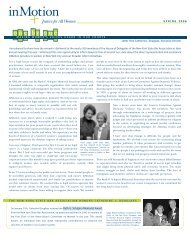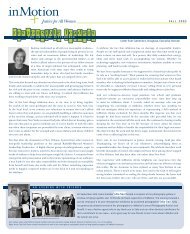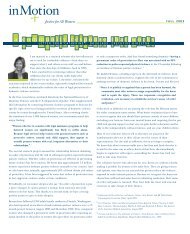THE BASICS Paternity Proceedings in New York State - inMotion Inc.
THE BASICS Paternity Proceedings in New York State - inMotion Inc.
THE BASICS Paternity Proceedings in New York State - inMotion Inc.
You also want an ePaper? Increase the reach of your titles
YUMPU automatically turns print PDFs into web optimized ePapers that Google loves.
<strong>THE</strong> <strong>BASICS</strong><br />
<strong>Paternity</strong> <strong>Proceed<strong>in</strong>gs</strong><br />
<strong>in</strong> <strong>New</strong> <strong>York</strong> <strong>State</strong>
<strong>THE</strong> <strong>BASICS</strong>: PATERNITY PROCEEDINGS IN NEW YORK STATE<br />
WHAT IS PATERNITY?<br />
<strong>Paternity</strong> means that a man is legally the father of a child. As the legal<br />
father, he has both legal rights and duties to his child.<br />
WHEN IS A FA<strong>THE</strong>R <strong>THE</strong> LEGAL FA<strong>THE</strong>R?<br />
• If the mother and father are married when the child is born, even<br />
if they are not married to each other now, the law says the father<br />
is the legal father.<br />
OR<br />
• If the mother and the father are not married when the child is born, but<br />
they both sign an Acknowledgment of <strong>Paternity</strong> form.<br />
OR<br />
• If a court issues an order, called an Order of Filiation, after the<br />
mother or the father starts a paternity proceed<strong>in</strong>g.<br />
WHAT IS AN ACKNOWLEDGMENT OF PATERNITY?<br />
When a baby is born to an unmarried woman, the hospital must give the<br />
mother and father (if he is there) the chance to sign an Acknowledgment<br />
of <strong>Paternity</strong> form. This is a written statement nam<strong>in</strong>g the person who is<br />
the father of the child.<br />
Once a man is declared the legal father of a child, he has the right to seek<br />
custody or visitation. He also has the legal obligation to pay child support.<br />
There are agencies that help with safety plann<strong>in</strong>g, counsel<strong>in</strong>g and<br />
consider<strong>in</strong>g the best legal choices.<br />
© 2013 Her Justice 2
<strong>THE</strong> <strong>BASICS</strong>: PATERNITY PROCEEDINGS IN NEW YORK STATE<br />
WHY WOULD <strong>THE</strong> FA<strong>THE</strong>R START A PATERNITY PROCEEDING?<br />
• To make sure someone else is not known as the father.<br />
• To have the right to visit with his child.<br />
• To have custody of his child.<br />
• To make sure you do not move far away with the child.<br />
An Order of Filiation is an order from a court nam<strong>in</strong>g the<br />
child’s father.<br />
WHEN DO I NEED TO GO TO COURT TO GET AN ORDER<br />
OF FILIATION?<br />
If you want the father of your child to pay you child support and you were<br />
never married to him and you do not have an Acknowledgment of <strong>Paternity</strong>,<br />
you must first have an Order of Filiation (an order nam<strong>in</strong>g the child’s<br />
father). Once the Court issues the Order of Filiation, it will automatically<br />
beg<strong>in</strong> a child support case. If you are or were married to the child’s father at<br />
the time of the child’s birth, you do not need to have an Order of Filiation;<br />
<strong>in</strong>stead you should just show the marriage certificate for yourself and the<br />
child’s father.<br />
If you were married to someone else at the time the child was born and your<br />
husband is not the child’s father, you must first have an Order of Filiation if<br />
you want the child’s father to pay you child support.<br />
If you do not want the father of the child to pay you child support, or if you<br />
are receiv<strong>in</strong>g cash public assistance for the child, then there is no need to get<br />
an Order of Filiation.<br />
You should know that an Order of Filiation gives the father the right to seek<br />
custody and/or visitation with your child. Be sure to speak with an attorney<br />
if you believe that it would not be safe for you to go to court or if you<br />
believe it would not be safe for you to get an Order of Filiation which could<br />
put you and your child <strong>in</strong> contact with the father.<br />
© 2013 Her Justice 3
<strong>THE</strong> <strong>BASICS</strong>: PATERNITY PROCEEDINGS IN NEW YORK STATE<br />
WHEN CAN I START A PATERNITY PROCEEDING?<br />
• You can start a paternity proceed<strong>in</strong>g at any time while you are<br />
pregnant and up until the child is 21 years old and support<strong>in</strong>g<br />
himself/herself.<br />
• You can start a paternity proceed<strong>in</strong>g even after your child turns 21<br />
years old IF the father has admitted he is the father <strong>in</strong> writ<strong>in</strong>g, or<br />
IF the father has been pay<strong>in</strong>g child support.<br />
• You do not need to be 21 years old to start a paternity case.<br />
• You can start a paternity case even if the father is dead, but only<br />
under certa<strong>in</strong> circumstances.<br />
WHERE SHOULD I GO TO START A PATERNITY PROCEEDING?<br />
The Family Court is the only court that can make an Order of Filiation.<br />
If you and the father live <strong>in</strong> the same county, you MUST go to the Family<br />
Court <strong>in</strong> that county. If you and the father live <strong>in</strong> different counties, you<br />
can go to the Family Court <strong>in</strong> either county.<br />
HOW DO I START A PATERNITY PROCEEDING IN<br />
FAMILY COURT?<br />
Go to the petition room of Family Court and a clerk will help you complete<br />
a paternity petition. The paternity petition says who you are, who the child is<br />
and who you believe the father is.<br />
Plan to spend the day there. Family Court is a busy place and you may have<br />
to wait for a long time. To cut down the time you spend <strong>in</strong> Family Court,<br />
br<strong>in</strong>g the follow<strong>in</strong>g <strong>in</strong>formation with you:<br />
• Your name, address and social security number<br />
• The name, address and social security number of the father<br />
• The child’s name, address and social security number<br />
(if already born)<br />
© 2013 Her Justice 4
<strong>THE</strong> <strong>BASICS</strong>: PATERNITY PROCEEDINGS IN NEW YORK STATE<br />
• The sex of the child (if already born)<br />
• The approximate dates of the beg<strong>in</strong>n<strong>in</strong>g and end of your<br />
sexual relationship with the father<br />
In Court, you will be the petitioner and the father will be the respondent.<br />
(If the father starts the paternity proceed<strong>in</strong>g, he will be the petitioner and<br />
you will be the respondent.) Sometimes the father is referred to as the<br />
putative father.<br />
Putative father means the Court assumes he is the father until it is<br />
decided whether or not he is the legal father.<br />
HOW DOES <strong>THE</strong> FA<strong>THE</strong>R FIND OUT THAT I AM STARTING<br />
A PATERNITY PROCEEDING?<br />
The father must be given a summons and a copy of the paternity petition you<br />
filed <strong>in</strong> court. You get both papers when you file the paternity petition. The<br />
summons tells the father (and you) when and where he must come to Family<br />
Court. The paternity petition tells him what the case is about.<br />
HOW DOES <strong>THE</strong> FA<strong>THE</strong>R GET SERVED WITH <strong>THE</strong><br />
SUMMONS AND PETITION?<br />
The person who delivers (serves) the summons and petition must be<br />
someone who is at least 18 years old, is not part of the case, and can fill out<br />
an Affidavit of Service. This means that you cannot serve the papers; they<br />
must be served by someone else.<br />
The Court will give you the Affidavit of Service form when you file the<br />
paternity petition.<br />
The Affidavit of Service is proof <strong>in</strong> writ<strong>in</strong>g that the papers<br />
were served.<br />
© 2013 Her Justice 5
<strong>THE</strong> <strong>BASICS</strong>: PATERNITY PROCEEDINGS IN NEW YORK STATE<br />
The father should get the papers at least 8 days before the next court date. If<br />
he asks the Judge for more time, generally the Judge will give it to him and<br />
you will have to come back at a later date.<br />
There are several ways to serve:<br />
• By personal service (hand<strong>in</strong>g the papers to the father).<br />
• By hand<strong>in</strong>g the papers to another person who is old enough and<br />
responsible, AND by mail<strong>in</strong>g a second copy of the summons and<br />
petition to the father’s last known home address. The papers can be<br />
served at the father’s place of work or home. If the father is served<br />
this way, the server must identify (by name or physical description)<br />
the person who was given the summons and petition. The server must<br />
write <strong>in</strong> the date, time and place that the person was given the papers.<br />
• If, after 2 or 3 reasonable efforts, service cannot be made, you can ask<br />
the Court to order another k<strong>in</strong>d of service aimed at gett<strong>in</strong>g actual<br />
notice to the father.<br />
• By send<strong>in</strong>g the papers by certified mail, return receipt requested, to<br />
the father’s last known address. People do not often use this method<br />
because if the father is not home to sign for the mail, or does not go to<br />
the post office to sign for the mail, this k<strong>in</strong>d of service does not work.<br />
IMPORTANT: Remember that you cannot deliver (serve)<br />
the papers to the father yourself.<br />
WHAT HAPPENS <strong>THE</strong> NEXT TIME I GO TO COURT?<br />
The next time you go to Court is on the date, time and place <strong>in</strong> the summons<br />
(the return date or hear<strong>in</strong>g date). First, you should let the court officer (or<br />
bailiff) who is stand<strong>in</strong>g <strong>in</strong> front of the courtroom know that you are there.<br />
When both you and the father are there, the court officer will write it down<br />
on his/her list of cases for the day. Your case will then be ready to be called<br />
when the Support Magistrate is ready to see you. Plan to spend at least the<br />
morn<strong>in</strong>g, and maybe even the whole day, <strong>in</strong> court.<br />
© 2013 Her Justice 6
<strong>THE</strong> <strong>BASICS</strong>: PATERNITY PROCEEDINGS IN NEW YORK STATE<br />
When the court officer calls your name and the father’s name, you and he<br />
will appear <strong>in</strong> the courtroom before a Support Magistrate.<br />
A Support Magistrate is not a Judge, but the law gives Support<br />
Magistrates the power to decide paternity cases.<br />
Support Magistrates used to be called Hear<strong>in</strong>g Exam<strong>in</strong>ers.<br />
The Support Magistrate must tell you and the father about your right<br />
to apply for free legal help if you or the father cannot afford a lawyer.<br />
Although it is helpful to have a lawyer, you may not need one. However,<br />
if the father has a lawyer, it is recommended that you have one as well.<br />
Also, you and the father each have the right to have blood or DNA<br />
tests done.<br />
If the father says he needs time to get a lawyer, the Support Magistrate will<br />
tell you both to come back to court on another day to give the father time to<br />
get a lawyer.<br />
IMPORTANT: It is extremely hard to change an Order of Filiation that<br />
was agreed to by the parties (“done on consent”) later on. So if there is any<br />
doubt or question about who the child’s biological father is, the respondent<br />
(father) should not consent.<br />
WHAT IF <strong>THE</strong> FA<strong>THE</strong>R DOES NOT SHOW UP WHEN<br />
HE IS SUPPOSED TO?<br />
If you give the Support Magistrate the Affidavit of Service or a receipt<br />
signed by the father, and it shows the Support Magistrate that the father<br />
was served with the papers at least 8 days before the return date, the<br />
Support Magistrate can make an Order of Filiation by default aga<strong>in</strong>st him.<br />
Sometimes the Support Magistrate will make you serve the father aga<strong>in</strong><br />
before mak<strong>in</strong>g a default order.<br />
© 2013 Her Justice 7
<strong>THE</strong> <strong>BASICS</strong>: PATERNITY PROCEEDINGS IN NEW YORK STATE<br />
SHOULD <strong>THE</strong> RESPONDENT (FA<strong>THE</strong>R) CONSENT TO AN<br />
ORDER OF FILIATION?<br />
Once you and the father are <strong>in</strong> Court before the Support Magistrate, the<br />
respondent (father) has the choice of agree<strong>in</strong>g to an Order of Filiation.<br />
Consent<strong>in</strong>g (agree<strong>in</strong>g) to an Order of Filiation means that both of you agree<br />
that the father really is your child’s biological father, and that neither you<br />
nor the father is request<strong>in</strong>g blood or DNA tests to prove it.<br />
WHAT IF <strong>THE</strong> FA<strong>THE</strong>R DENIES THAT <strong>THE</strong> CHILD IS HIS?<br />
The Support Magistrate will order blood or DNA tests on you, the<br />
putative father and the child. Then the Support Magistrate can send<br />
the case to a Judge.<br />
If the putative father denies that he is the father, and tests are ordered, you<br />
will not have the chance to give evidence or to get an Order of Filiation that<br />
day. The case will be rescheduled (sometimes called “adjourned” or “put<br />
over”) for a later date. If tests are ordered, the next hear<strong>in</strong>g date will be set<br />
for a date after the tests are completed.<br />
If the father is dead, DNA test<strong>in</strong>g may be done on the father’s parents.<br />
HOW DO I GET BLOOD OR DNA TESTS?<br />
The Court will mail you a notice tell<strong>in</strong>g you when and where to go for<br />
your test. The father will also receive a notice. When you go to the lab<br />
for the test, br<strong>in</strong>g:<br />
• The child<br />
• A picture ID<br />
• Your Social Security number<br />
• Your date of birth<br />
• Your child’s date of birth<br />
© 2013 Her Justice 8
<strong>THE</strong> <strong>BASICS</strong>: PATERNITY PROCEEDINGS IN NEW YORK STATE<br />
You will be asked to sign a paper about whether you or your child has ever<br />
gotten a blood transfusion or bone marrow transplant. If the answer is “yes,”<br />
they will ask when it happened.<br />
The lab will take your picture and f<strong>in</strong>gerpr<strong>in</strong>ts and also the child’s.<br />
For a blood test, the lab will take a sample of your and the child’s blood.<br />
For a DNA test, the test is taken by wip<strong>in</strong>g the <strong>in</strong>side of your and your<br />
child’s mouth with a small bit of cotton on a stick. There are no needles.<br />
WHO PAYS FOR <strong>THE</strong> TEST?<br />
If the Court decides that you or the father cannot pay for the test, the Court<br />
will have the costs paid from public funds. If you can pay, you will have to<br />
pay for the test UNLESS the test shows the putative father is really the<br />
father. If he is the father, he will have to pay for the test.<br />
The Court might order that you and the father share the cost.<br />
WHAT IF <strong>THE</strong> FA<strong>THE</strong>R DOES NOT SHOW UP FOR<br />
<strong>THE</strong> TEST?<br />
At the next court date, the Support Magistrate can issue an order of<br />
temporary child support aga<strong>in</strong>st him.<br />
WHEN DO I GET A CHANCE TO PROVE PATERNITY?<br />
At the next hear<strong>in</strong>g date after the tests are completed.<br />
HOW DO I PROVE PATERNITY?<br />
To make an Order of Filiation, the Support Magistrate must be entirely<br />
satisfied by “clear and conv<strong>in</strong>c<strong>in</strong>g evidence” that the respondent (father) is<br />
the biological parent. At the court hear<strong>in</strong>g, you must conv<strong>in</strong>ce the Support<br />
© 2013 Her Justice 9
<strong>THE</strong> <strong>BASICS</strong>: PATERNITY PROCEEDINGS IN NEW YORK STATE<br />
Magistrate that the father is the child's biological parent. The Support<br />
Magistrate looks at the evidence, which can <strong>in</strong>clude testimony, papers and<br />
DNA test results.<br />
If the respondent (father) takes DNA or blood tests, the results are<br />
considered evidence. If the results show that there is a 95% chance or<br />
higher that he is the father, <strong>New</strong> <strong>York</strong> law says he is the father. You do<br />
not have to give or show the Support Magistrate any other evidence.<br />
Then the respondent (father) has the burden of prov<strong>in</strong>g he is NOT the father.<br />
It is very hard for the father to conv<strong>in</strong>ce the Support Magistrate that he is not<br />
really the father because blood and DNA tests are very accurate. If the father<br />
cannot give any evidence, or cannot give enough to conv<strong>in</strong>ce the Support<br />
Magistrate that he is not the father, the Support Magistrate will issue an<br />
Order of Filiation nam<strong>in</strong>g the father as the legal father.<br />
WHAT IF <strong>THE</strong> TESTS SHOW THAT <strong>THE</strong>RE IS LESS THAN<br />
A 95% CHANCE <strong>THE</strong> RESPONDENT IS <strong>THE</strong> FA<strong>THE</strong>R?<br />
You must show the Support Magistrate other evidence that the father<br />
is the real father.<br />
WHAT KIND OF EVIDENCE IS GOOD?<br />
Many different types of evidence may help prove paternity. Here are<br />
some examples:<br />
• The father knows the child uses his last name and has not objected,<br />
even though the father has not signed the Acknowledgment of<br />
<strong>Paternity</strong>, and his name is not on the birth certificate.<br />
• The father has treated the child as his own.<br />
• The father has helped pay for the child’s expenses.<br />
• The father has claimed the child as his own <strong>in</strong> some other court<br />
proceed<strong>in</strong>g or paper.<br />
• The father has told other people the child is his own.<br />
© 2013 Her Justice 10
<strong>THE</strong> <strong>BASICS</strong>: PATERNITY PROCEEDINGS IN NEW YORK STATE<br />
• The father has sent the child presents or cards show<strong>in</strong>g that he treats<br />
the child as his own.<br />
CAN I MAKE <strong>THE</strong> FA<strong>THE</strong>R TESTIFY IN <strong>THE</strong> PATERNITY<br />
PROCEEDING?<br />
No. But you can br<strong>in</strong>g <strong>in</strong> other witnesses to tell the Court what the father<br />
told them about the child.<br />
WHAT IF <strong>THE</strong> FA<strong>THE</strong>R SAYS I HAD SEX WITH SOMEONE<br />
ELSE AROUND <strong>THE</strong> TIME I GOT PREGNANT?<br />
He cannot just say that. He must show some other evidence to prove<br />
what he says.<br />
WHAT IF I WAS MARRIED TO SOMEONE ELSE WHEN<br />
<strong>THE</strong> CHILD WAS BORN?<br />
You and your husband can tell the Support Magistrate that the two of you<br />
did not have sex dur<strong>in</strong>g the time your child was conceived.<br />
Also, you can present proof that your husband was somewhere away from<br />
you dur<strong>in</strong>g this time, for example, <strong>in</strong> the armed forces or <strong>in</strong> prison.<br />
WHAT IF <strong>THE</strong> FA<strong>THE</strong>R TAKES <strong>THE</strong> TESTS BUT DOESN’T<br />
SHOW UP IN COURT AFTER TAKING <strong>THE</strong> TESTS?<br />
If the test results do not rule him out as a father, the Support Magistrate can<br />
make an Order of Filiation along with an order of child support aga<strong>in</strong>st him.<br />
WHAT HAPPENS WHEN <strong>THE</strong> JUDGE DECIDES <strong>THE</strong> CASE?<br />
If the Support Magistrate decides that the father is not the biological parent,<br />
your case will be dismissed.<br />
© 2013 Her Justice 11
<strong>THE</strong> <strong>BASICS</strong>: PATERNITY PROCEEDINGS IN NEW YORK STATE<br />
If the Support Magistrate decides that the father is the biological parent, the<br />
Support Magistrate will make an Order of Filiation. The Order of Filiation<br />
must conta<strong>in</strong> the child’s social security number, if available.<br />
GETTING CHILD SUPPORT AFTER A PATERNITY CASE<br />
If the Support Magistrate issues an Order of Filiation, he or she will then<br />
automatically beg<strong>in</strong> a child support case. You do not need to file a separate<br />
child support petition if the Court issues an Order of Filiation at the<br />
conclusion of a paternity case. The Order of Filiation is the legal foundation<br />
for the Court to order the father to pay child support.<br />
For <strong>in</strong>formation on child support <strong>in</strong> <strong>New</strong> <strong>York</strong> <strong>State</strong>, please see The Basics<br />
Series booklet entitled “Gett<strong>in</strong>g Child Support <strong>in</strong> <strong>New</strong> <strong>York</strong> <strong>State</strong>.”<br />
© 2013 Her Justice 12
<strong>THE</strong> <strong>BASICS</strong>: PATERNITY PROCEEDINGS IN NEW YORK STATE<br />
NOTES:<br />
© 2013 Her Justice 13
<strong>THE</strong> <strong>BASICS</strong>: PATERNITY PROCEEDINGS IN NEW YORK STATE<br />
NOTES:<br />
© 2013 Her Justice 14
















